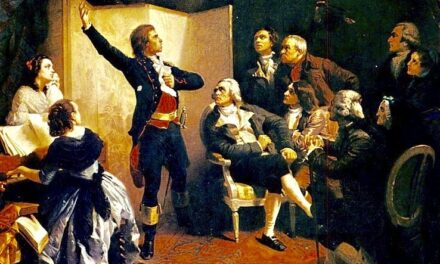We support our Publishers and Content Creators. You can view this story on their website by CLICKING HERE.
What is at the heart of the success story of the World Villages for Children? Not just a school, not just vocational training, but the Catholic faith. The joy, hope, and faith of the young Sisters of Mary is infectious. The Catholic faith teaches that, with God’s help, we can change—change ourselves, change our families, change our world.
I make no claims to be an expert in the church’s ministry to the poor, but after a few mission trips to El Salvador, leading a parish in an economically challenging part of town, and a recent pilgrimage to Mexico, I’ve seen what works and what doesn’t.
Robert Lupton has worked in urban relief programs for decades, and in his book Toxic Charity he outlines the ways our charitable efforts often sabotage the very people we intend to help. One of the practices he exposes is the toxicity of the short-term gift. The generous and compassionate soul, moved by the plight of the poor, will often instinctively open his or her wallet to hand out cash. The gift may be in kind: the food pantry, the soup kitchen, or the homeless shelter.
While the short-term gift relieves the poverty immediately, the long-term effect is often counter-productive. The hungry person will be hungry again tomorrow. The homeless person will need shelter the next day. Consequently, the needy person may become dependent on the short-term fix, and in effect all we have done is fund their way of life. If all we do is the short-term fix we are doing little more than funding and enabling poverty.
Furthermore, the needy person’s way of life may be the result of a lifetime of living on the margins. A child believes his family’s way of life is normal, and that “this is just the way life is.” If the needy person comes from a background of poverty and dependency, he may be trapped in a cycle of poverty. Lacking in aspiration or the vision of a different way of life, he naturally also lacks the know-how and method to break out of the cycle of poverty.
That cycle is often reinforced with the powerful influences of family and peer pressure. A youngster who aspires to a better life may be accused of being uppity—disloyal to the clan, and the accusations may be enforced with recrimination, isolation, and rejection, thus further trapping the person in the cycle of poverty or ejecting him into a world for which he is unprepared and destined for failure.
The way, therefore, to defeat poverty is to break the cycle of poverty, and the way to break the cycle of poverty is to educate the children. Children are the learners. They have a natural optimism and hope. They can envision a different future, but for their education to be effective they need to be removed from the cycle and immersed in a new, positive environment where change is possible and aspiration is encouraged.
In a recent pilgrimage to Mexico, we venerated the tilma of St Juan Diego and also visited Girlstown in the nearby town of Chalco. Girlstown is one school in the network of World Villages for Children—boys’ and girls’ boarding schools run by the Sisters of Mary, a new religious order founded by an American priest, Ven. Aloysius Schwartz. With schools in Korea, the Philippines, Mexico, Guatemala, Brazil, and Tanzania, the sisters now educate more than 20,000 children.
Our visit to Girlstown was truly life-changing. We witnessed 3,000 girls from the poorest villages in Mexico settled together in a secure, beautiful campus to receive a free education, which includes formation in the faith, vocational training, and career guidance. In an amazingly joyful atmosphere, the girls are prepared for college or gain experience in computer technology, baking and catering, accountancy, hospitality, sewing, music, art, and landscaping. At Boystown there is a welding shop, a body shop, car repair, computer programming, a bakery, a barbershop, jewelry and souvenir manufacture, catering, a fish farm, and vegetable greenhouses.
At the World Villages for Children the Sisters of Mary break the cycle of poverty because the boys and girls return to their villages sharing their education, their skills, and most of all their aspiration—the belief and confidence that they can take charge and break the cycle of despair. As they do, their families see their world afresh. Younger siblings are inspired to break free from the poverty. The graduates often use their earnings to pay for an education for relatives and siblings. Some start businesses and employ family members and friends.
This is the successful model for breaking poverty—not just giving people stuff, but enabling them to learn and earn and change the course of their lives. What is at the heart of this success story? Not just a school, not just vocational training, but the Catholic faith. The joy, hope, and faith of the young Sisters of Mary is infectious. The Catholic faith teaches that, with God’s help, we can change—change ourselves, change our families, change our world.
That confidence comes from the faith in God’s assistance. It is knowing first-hand at a personal level what God can accomplish when we have the confidence to work with Him for positive change. That faith is empowered, inspired, and enlightened by the presence of Christ in the world, and that presence is focused and applied in the daily celebration of the Eucharist. As a Catholic priest, Father Al Schwartz was deeply devoted to the Eucharist and knew that his extraordinary work was only possible in the power of Jesus Christ present in the Eucharist, and thus present in the world.
Breaking the power of poverty doesn’t come cheaply. It is comparatively easy to write out a check or hand a homeless person a couple of dollars. Building and running a boarding school is an expensive, complicated, and exhausting enterprise. Readers can help this worthy cause in several ways:
First, take time to learn more about Father Schwartz and World Villages for Children here.
Priest and Beggar, published by Ignatius Press, is the excellent biography of Fr. Al Schwartz.
You might want to join me on a pilgrimage to Our Lady of Guadalupe and Girlstown. If so, be in touch with the tour organizer, Susan Driscoll: sdriscoll@worldvillages.org
If you can, give and pray generously for those who are working so hard to help thousands of poor children break free from the cycle of poverty.
The Imaginative Conservative applies the principle of appreciation to the discussion of culture and politics as we approach dialogue with magnanimity rather than with mere civility. Will you help us remain a refreshing oasis in the increasingly contentious arena of modern discourse? Please consider donating now.
The featured image is courtesy of World Villages for Children.

 Conservative
Conservative  Search
Search Trending
Trending Current News
Current News 






